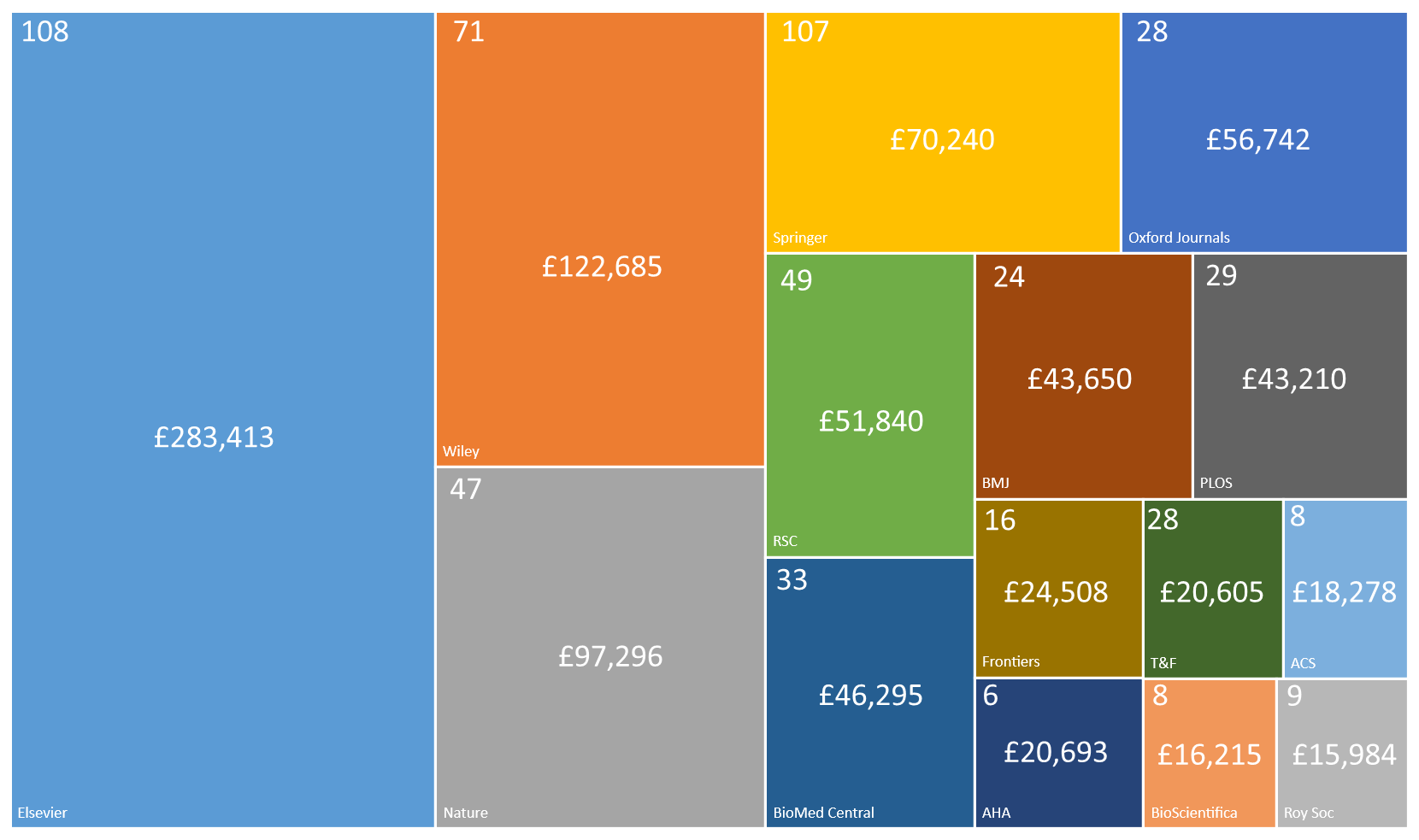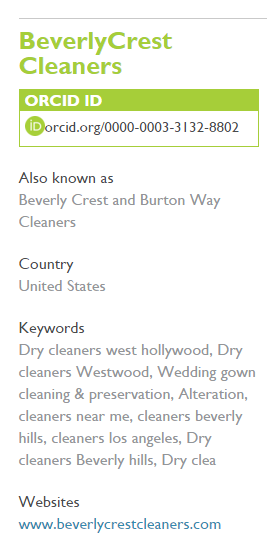The University of Edinburgh receives two main block grants from Research Councils UK (RCUK) and Charity Open Access Fund (COAF) to support researchers funded by them to comply with their open access policies. The Library’s Scholarly Communications Team manages these block grants on behalf of the institution. In 2016/17 we spent £1,167,966 to make 697 articles open access via the Gold open access route. In addition, £28,951 was spent on other publication costs, for example page and colour charges.
A summary of the open access charges made to the top 15 publishers is shown in the table and figures below:
| Row Labels | Count of APC paid | Sum of APC paid (£) | Ave APC (£) |
| Elsevier | 108 | £283,413 | £2,624 |
| Wiley | 71 | £122,685 | £1,728 |
| Nature | 47 | £97,296 | £2,070 |
| Springer | 107 | £70,240 | £656 |
| Oxford Journals | 28 | £56,742 | £2,026 |
| Royal Society of Chemistry | 49 | £51,840 | £1,058 |
| BioMed Central | 33 | £46,295 | £1,403 |
| BMJ Publishing Group Ltd | 24 | £43,650 | £1,819 |
| Public Library of Science | 29 | £43,210 | £1,490 |
| Frontiers | 16 | £24,508 | £1,532 |
| American Heart Association | 6 | £20,693 | £3,449 |
| Taylor & Francis | 28 | £20,605 | £736 |
| American Chemical Society | 8 | £18,278 | £2,285 |
| BioScientifica | 8 | £16,215 | £2,027 |
| Royal Society Publishing | 9 | £15,984 | £1,776 |
Points and trends to note:
- Our overall spend on open access in 2016/17 was £1,167,966 which bought 697 papers, with an average Article Processing Charge (APC) of £1,676.
- The open access expenditure is dominated by three large publishers: Elsevier, SpringerNature and Wiley. These 3 publishers account for 53% of our total spend. Note that we have shown SpringerNature as three individual publishers in the table and figure as they have distinct publishing identities – Springer, Nature and BioMedCentral.
- The top individual publisher (Elsevier) alone accounted for 24% of the total spend, with their APCs 56% more expensive than the average.
- Generally speaking, we found the highest individual APCs were from US society publishers, like the American Heart Association or American Chemical Society.
- Best value APCs were from publishers where we have offsetting or national agreements with – for example Taylor & Francis, Springer and Royal Society of Chemistry.
- 70% of our expenditure is on Hybrid Gold OA – where journals charge a subscription and APCs – rather than pure Gold OA (30%) where APCs are the only charge.
- Looking at the whole dataset Hybrid Gold OA is more expensive (£2,075) than pure Gold OA APCs. (£1,581).
Discussion
The University of Edinburgh publishes 6 -7,000 journal articles and conference proceedings per year. In the current market conditions if we were to fully transition to Gold OA then we estimate it would cost in the region of £10M per year. To put this in context Edinburgh University Library spends approximately £4M per year on e-journal subscriptions so this represents a significant uplift on the total cost of publication. I suspect this figure is similar for other research-intensive universities.
At its current scale and intensity, open access as purely delivered by Hybrid Gold OA and Gold OA alone is not likely to happen. Any increase to the total cost of publication is not acceptable.
If we wish to transition to full open access then significant cost mitigation for paid open access needs to occur, and alternative low cost or no cost options need to be investigated and adopted. Some options are described below.
Reducing cost recommendations
- Push for offsetting deals : Libraries should be a) requesting offsetting deals, b) pushing for significant discounts, and c) helping publishers adopt transformative business models.
Examples of publishers offering good offsetting schemes are IOP – where an actual rebate is given depending on Gold OA spend – and SAGE Publishing who globally discount the subscription rate of journals where more than 5% of articles are published as Gold OA. SAGE also offer steep open access discounts of 80% for some members of consortia subscriptions. Taylor & Francis are another publisher which significantly reduce APC cost (by 75%) to consortia members. These steep discounts are welcome, but have a fundamental problem in that they rely on privilege. Discounts are not available to all authors as they rely on institutions having a subscription.
Transformative business models such as the UK Springer Compact national agreement, or the Royal Society of Chemistry Read and Publish agreement, are also welcome as they lower transactional barriers for authors to participate in Gold OA. This leads to a greater coverage of open access articles in journal titles, rather than the patchy open access that Hybrid Gold OA delivers. The overall costs are also appreciably lower than the cumulative costs seen with Hybrid Gold OA – look at the difference in our expenditure between Elsevier and Springer for a similar amount of Gold OA articles published.
- Support ‘low cost and no cost’ Gold OA : Academic and National Libraries should support open access initiatives that are inclusive and open to scholars who do not have budgets for publishing.
Gold OA does not necessarily equate to paid open access. Many academic or library-led publishing initiatives do not charge Article Processing Charges as the costs are covered through alternative mechanisms. Some examples of innovative academic or library-led publishing activities are described below.
Edinburgh University Library provides an Open Journal Service which is available free of charge to University of Edinburgh students and academics. It provides a hosting platform for academic and student-led groups to create and publish their own Open Access journal. Currently the service has a portfolio of 16 journals and is looking to grow and develop in the coming year.
The Open Library of Humanities (OLH) is a charitable organisation dedicated to publishing open access scholarship with no author-facing article processing charges. The OLH publishing platform supports academic journals from across the humanities disciplines, as well as hosting its own multidisciplinary journal. The University of Edinburgh has opted to support the Open Library of Humanities at a higher rate than required. This additional support will enable the OLH to continue its growth mission to convert subscription journals to a solid, ongoing, open-access model, with no author-facing charges.
- Reduce reliance on Hybrid Gold OA : Hybrid Gold OA – where journals charge both subscriptions and Article Processing Charges – is too expensive.
Unfortunately, Hybrid Gold OA which accounts for 70% of our expenditure are significantly more expensive than pure Gold OA costs. It is not uncommon to receive invoices of $5,000 for individual APCs. Our open access block grants are supported either directly by taxpayers money (RCUK), or from charitable organisations (COAF), so it is imperative that anyone managing these funds should be seeking best value for money. I would find it very difficult to explain to someone who has raised money for Cancer Research UK the hard way by running the London Marathon that their sponsorship money has only paid for half an APC. Where research funders policies allow we should be seeking to reduce our reliance on Hybrid Gold OA by utilising alternative mechanisms like Green OA, which we will visit in more detail in tomorrow’s blog post.
















